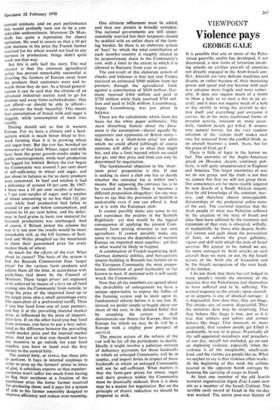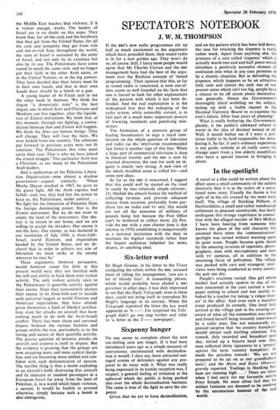VIEWPOINT
Violence pays
GEORGE GALE
It is possible that one or more of the Pales- tinian guerrilla outfits has developed, if not discovered, a new form of terrorism involv- ing attacks on civilian aircraft of countries not directly engaged in the Arab-Israeli con- flict. Aircraft are very delicate machines and despite, or rather because of, their increasing power and speed and size become with each new advance more fragile and more vulner- able. It does not require much of a bomb to blow a hole or to start a fire in an air- craft; and it does not require much of a hole or fire swiftly to bring the aircraft to des- troy itself and everything and everyone it carries. As in the more traditional forms of terrorist activity, innocent or, more accur- ately, random people get killed. It arouses very natural horror, for the very random selection of the victims itself makes men very far removed from the conflict think, as an aircraft becomes a tomb, 'there, but for the grace of God, go I'.
There is little of logic in the horror we feel. The enormity of the Anglo-American attack on Dresden, despite continual pub- licity. is still quite unappreciated in England and America. The larger enormities of war we do not grasp, and the truth is not that we cannot but that we will not grasp them. Our consciences are far more readily angered by new details of a South African iniquity than by old knowledge of the constant, mas- sive, and therefore almost unimaginable dictatorships of the proletariat police-states of the east. The essential injustice that the Arab people of what was Palestine suffered by the creation of the state of Israel and since then have suffered by the existence and expansion of that state is obscured, wilfully, or neglectfully, by those who despise Arabs, feel sorrow and guilt about the persecution of Jews, or admire the great gallantry, vigour and skill with which the state of Israel survives. We appear to be, indeed we are. far more outraged by Arab attacks on civil aircraft than we were, or are, by the Israeli seizure of the Arab city of Jerusalem and by the Israeli occupation of the west bank of the Jordan.
I do not think that there has yet lodged in many people's minds the enormity of the injustice that the Palestinians feel themselves to have suffered and to be suffering. The normal response to the attacks upon aircraft, or in airports, is one of shocked outrage: it is disgraceful, how dare they, they are thugs. The attacks are, of course, disgracefuL That the terrorists dare may be surprising. That they behave like thugs is true, just as it is true that soldiers and sailors and airmen behave like thugs. That innocent, or, more accurately, that random people get killed is undeniable, in war or in peace. Practically all the self-appointed moralisers and preachers of our day, myself not excluded, go on and on deploring violence, especially when the violence is of the imaginable, small-scale kind, and the victims are people like us. What we neglect to say is that violence often works. At the beginning of this week the airlines reacted to the apparent bomb outrages by banning the carrying of cargo to Israel.
At least one member of the old Jewish terrorist organisation Irgun Zvai Leumi now sits as a member of the Israeli Cabinet. The terrible swift sword of Israel in the six-day war worked. The entire post-war history of the Middle East teaches that violence, if it is violent enough, works. The leaders of Israel are in no doubt on this score. They know that, for all the cash and the hardware that they get from the United States, for all the cash and sympathy they get from rich and not-so-rich Jews throughout the world, the state of Israel is sustained by the army of Israel, and not only by its existence but also by its use. The Palestinians have come round to much the same view, and no longer put their faith in the other Arab states, or in the United Nations, or in the big powers. They have decided that their future must lie in their own hands, and that in their own hands there should be a bomb or a gun.
A young leader of Al Fatah said to me the other week in Amman, 'We think the slogan "a democratic state" is the best slogan, one in which Jews and Christians and Moslems can live together, after the liquida- tion of Zionist institutions. We think that, at this moment, through our fighting, a contra- diction between Jew and Zionist will happen.
We think the Jews are human beings. They will change. They will face the facts. We were kicked from our country. The solutions put forward in previous years were not fit solutions. The Palestinians this time must carry their case. That is why we have joined the armed struggle.' This particular Arab was a Christian, as are many of the Palestinian Arab leaders.
And a spokesman of the Palestine Libera- tion Organisation—now almost a shadow government—argued similarly : 'When Moshe Dayan atacked in 1967, he gave us the green light. All the Arab regimes had failed—and, too, they had lost the power to keep us, the Palestinians, under control . . . We fight for the liberation of Palestine from the foreign dominating power, that is, the Zionist movement. But we do not want to empty the land of the newcomers. Our des- tiny is to return to our home, and we are willing to accept the invaders. Our enemy is not the Jews. Our enemy, as was declared in our resolution of July 1968, is three-fold: Israel, world Zionism, and imperialism headed by the United States, and we de- clared that in order to achieve our aim of liberation we must strike at the enemy wherever he may be.'
These arguments, however persuasive, would however count for little in this present world were they not fortified with the will and ability to back them with violent activity. The only violent activity open to the Palestinians is guerrilla activity against their enemy. Since they conveniently declare their enemy to be three-fold and to include such universal targets as world Zionism and American imperialism, they have already given themselves a kind of blanket justifica- tion, even for attacks on aircraft that have nothing much to do with the Arab-Israeli conflict. There has been sharp and personal dispute between the various factions and groups within the PLO, particularly as to the timing and nature of their guerrilla activity. The precise question of' terrorist attacks on aircraft and airports is itself in dispute. But the evidence is growing that the groups are now accepting more and more central discip- line, and are becoming more unified and con- fident with each demonstration of success The terrible thing is that a bomb exploding in an aircraft's hold, destroying that aircraft and its innocent or random passengers in a European forest far away from the land of Palestine, is, in a world which heeds violence, a success. It would be foolish to pretend otherwise, simply because such a bomb is also outrageous,



































 Previous page
Previous page